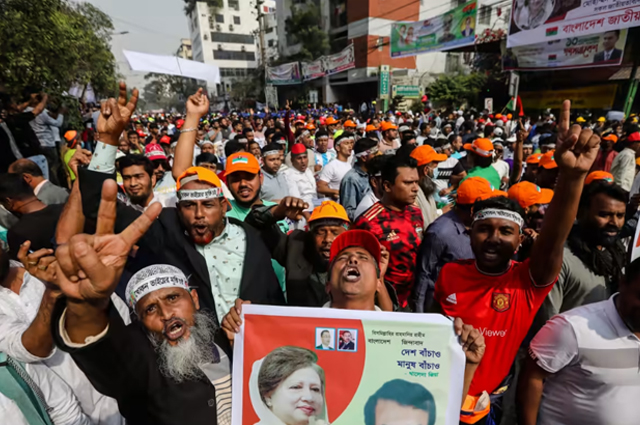Experts warn of 2023 debt challenge and election considered unlikely to be fair

DHAKA — Political tensions in Bangladesh are boiling after a weekend that saw tens of thousands take to the streets against the government, raising fears of violence and repression as well as concerns over the impact on an already fragile economy.
A series of demonstrations organized by the opposition Bangladesh Nationalist Party (BNP) in recent months culminated in a huge rally in Dhaka on Saturday, despite extensive government efforts to keep a lid on it. The BNP’s head office in the capital was cordoned off, while roads were blocked to prevent party leaders and activists from joining the protest.
This came three days after at least one BNP activist was reported killed and hundreds were arrested as the party was preparing for Saturday’s rally. The detainees included a number of party leaders.
The BNP has put forward a 10-point list of demands and vowed to fight until the Awami League government of Prime Minister Sheikh Hasina quits to make way for a nonpartisan administration, which would see the country through a general election that is expected in January 2024.
But expert observers doubt the government will budge and remain pessimistic about the chances of a free and fair election. The Awami League’s landslide victory in 2018 was marred by reports of violence and allegations of vote rigging — charges denied by the government. With tempers running hot and maturing foreign loans looming over the dollar-strapped and inflation-gripped economy, Bangladesh appears to be heading into an especially treacherous period.
Ali Riaz, a distinguished professor of political science at Illinois State University in the U.S., said that under the present system it is unlikely that a level electoral playing field can be created.
“The civil administration, law enforcing agencies, and the election commission have acted in unison in 2018. Unless a neutral government is in place, a repeat of 2018 cannot be prevented,” he told Nikkei Asia.
He said the only option for the BNP is to mount pressure on the government through street agitations. Riaz did say that much depends on whether the BNP can galvanize the masses in the coming days and whether other parties join its movement. Some like-minded political parties, including the Bangladesh Jamaat-e-Islami party and other small groups, have expressed support for the BNP’s demands.
“Many people from various social strata are outraged by the situation, especially due to the economic hardship,” Riaz said, adding the government is under pressure from the international community to hold a free election and open space for opposition.
Indeed, amid the uproar over the recent rallies and the government’s efforts to thwart them, foreign missions in Bangladesh — including the representative of the United Nations in Dhaka and the U.S. Department of State — urged the Hasina administration to allow freedom of expression and stressed the importance of a fair and peaceful electoral process.
Like Riaz, however, M. Sakhawat Hossain, a former election commissioner and retired brigadier general, was skeptical that the government would meet the opposition demands unless it is somehow forced to do so. “We did not see any political motion without violence in the past,” he said, noting the government holds all the “coercive” power.
“I am not hopeful what is going to happen after the next six months and late next year before the general election,” Hossain added. “But I am sure, unless there is any compulsion, the government won’t do anything beyond the present constitutional system, because that suits them.”
Attempting to crank up the pressure further, the BNP’s members of parliament resigned on Sunday. But Obaidul Quader, general secretary of the Awami League, said the same day that the resignations would not have any impact, since they account for a fraction of the seats in the legislature. The BNP had held just seven seats, versus the Awami League-led 14-party grand alliance that won 247 seats out of 300 in the last election.
The “BNP is daydreaming about the fall of the government,” local media quoted Quader as saying. “At Saturday’s rally, they could not do anything other than causing panic. There was nothing new in their 10-point demand. They have lost in the game and they will lose in the election too.”
Meanwhile, experts worry the upheaval could dash hopes for a recovery in the economy, which has been under tremendous pressure since Russia invaded Ukraine earlier this year, unleashing global inflationary ripple effects.
The political tensions are taking a toll on some businesses in the vicinity of the large rallies, as traffic has been restricted and shops have apparently been compelled to close one or two days before the protests.
More broadly, concerns persist over the country’s foreign currency reserves, which have dropped below $34 billion, from $48 billion in August 2021. A stricter calculation method employed by the International Monetary Fund puts the coffers at $26 billion. The government is anxiously awaiting IMF board approval for $4.5 billion in loans to replenish the reserves — making it the third troubled South Asian nation to turn to the international lender this year, after Sri Lanka and Pakistan.
For now, rebounding exports and remittances have raised hopes in recent weeks that the country can avoid a more severe economic crisis, but officials are bracing for increased financial pressure early next year, when some large foreign loans begin to come due.
Ratings agency Moody’s Investors Service on Friday placed Bangladesh’s Ba3 long-term issuer and senior unsecured ratings on review for a downgrade.
“The decision,” the agency said, “is driven by Moody’s assessment that Bangladesh’s deteriorating external position raises external vulnerability and government liquidity risks in a way that may not be consistent with its current rating.”
Ahsan H. Mansur, executive director of the Policy Research Institute of Bangladesh, said the coming year will be a “complicated one for sure,” ahead of the general election.
“There are internal and external economic challenges alongside political challenges, which are intertwined,” he said.
Mansur, a former top IMF official, said issues such as capital flight and a tendency to postpone investments were likely linked to election-related uncertainty.
“These have to be handled seriously through proper economic management,” he said. “Otherwise, economic recovery may face a setback.”
News Sources: www.asia.nikkei.com

